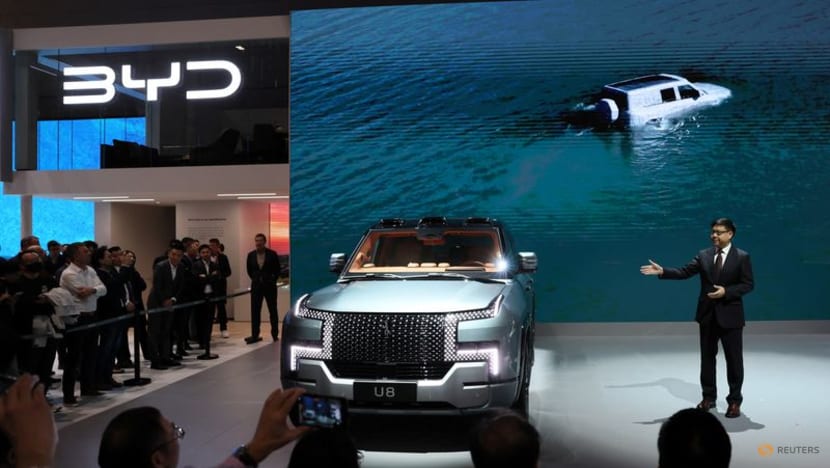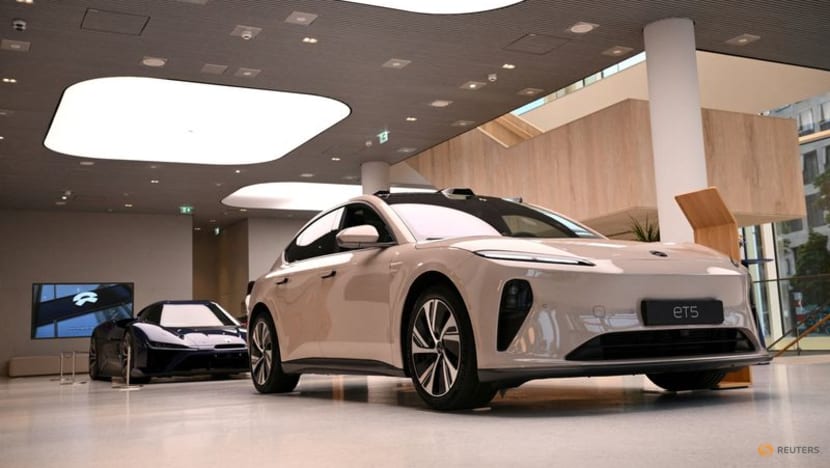EU’s move to hit Chinese EV makers with higher tariffs will not affect pricing much: Experts
The European Union is set to impose additional tariffs of up to 38.1 per cent on Chinese electric vehicle imports in July, but these levies could be adjusted.


This audio is generated by an AI tool.
The European Union (EU)’s decision to impose additional tariffs of up to 38.1 per cent on Chinese electric vehicle (EV) imports will not have much impact on prices, as China’s automakers can absorb the extra costs and still make a profit, analysts told CNA.
These further tariffs will not keep Chinese EVs out of the European market either, given their competitive pricing and quality compared with their European counterparts, they added.
“Chinese companies are way ahead of the curve here,” said Mr Anthony Sassine, senior investment strategist at investment firm KraneShares.
“I think there are reports that show that Chinese companies have at least 25 to 30 per cent price advantage, just due to their manufacturing, due to their advancement in research and development,” he told CNA’s Asia Tonight on Wednesday (Jun 12).
The extra tariffs, announced on Wednesday, are a result of an EU probe into alleged unfair state subsidies given to China’s car manufacturing industry that posed an economic threat to European rivals. They are also a bid by the bloc to tackle Chinese industrial overcapacity flooding the EU.
Specific duties were set for Chinese EV makers: 17.4 per cent for BYD, 21 per cent for Nio, and 38.1 per cent for state-backed SAIC Motors.
The EU said the level of tariffs depended on the level of state subsidies received by the firms.
They come on top of an existing 10 per cent levy on cars imported into the EU.
The tariffs are set to kick in on Jul 4, but could be adjusted as Chinese companies have till then to provide evidence that could challenge the EU’s findings.
When markets opened on Thursday morning, trade was relatively upbeat among Chinese EV makers, though broader sentiment was more mixed.
Shares of BYD were up 7.27 per cent. Nio also traded higher at 3.64 per cent, while SAIC Motors was down by 2.26 per cent.
Mr Kingsley Jones, chief investment officer at boutique investment advisory firm Jevons Global, said this could seem “a bit counterintuitive” but pointed out the differential pricing regime.
Given that market leader BYD was hit with the lowest amount of tariffs, this would only cement its leading position, Mr Jones said.
He said the company also has “pretty cheap products” like the BYD Seagull hatchback, which retails at around US$10,000 to US$15,000.
“I don't think it's going to keep those cars out of the European market because they actually compete very well on price and quality, even with the tariffs,” Mr Jones noted.
“So I don't think this is going to really take much wind out of the sails for selected Chinese EV makers and that's why I think the stock is up,” he told CNA’s Asia First.
“PROTECTIONIST BEHAVIOUR”
On Thursday, China said it "reserves the right" to file a suit with the World Trade Organization (WTO) over the tariffs.
Beijing has urged the EU to reconsider the tariffs and stop going further in the “wrong direction”, according to Chinese state news agency Xinhua. It has called the tariffs “protectionist behaviour”.
Mr Sassine from KraneShares concurred, noting that the EU's attempts to align with the United States has led to “very disappointing decisions”.
Last month, US President Joe Biden announced a 100 per cent tariff on Chinese-made EVs to protect US manufacturers from cheaper imports. Both superpowers have been in a trade war for years.
The additional EU tariffs come as European politics is moving towards a more conservative position. Far-right parties made gains in the recent European parliamentary elections.
The Russia-Ukraine war also prompted the EU and US to find more reasons to put pressure on China to back down from its pro-Russia position, Mr Sassine added.
“I think we’re going to see more inflation in the auto industry in Europe,” he cautioned.
Mr Jones agreed that Europe will see vehicle inflation.
He also called the EU’s move “a bit perplexing” as it will likely not help European competitiveness in the long run or prevent the leading Chinese EV makers from extending their market lead.
Professor Joseph Siracusa, political commentator and dean of global futures at Curtin University, said Europe has to tread carefully as China is its biggest trading partner.
“Going after EVs is okay. It doesn’t affect that much, but the game is changing,” he told CNA938.
“This trouble with raising tariffs – it goes both ways. if you make it harder for me to deal, and I'm going to make it harder for you to deal, at the end of the day, who suffers?
"People suffer – (they) can't get the televisions, or their computers or whatever it is, at bargain prices.”

WILL EUROPE’S CLIMATE GOALS BE AFFECTED?
Experts said that in the longer run, these tariffs could impact the EU’s sustainability goals. It has committed to making all new cars and vans zero-emission from 2035.
“In my opinion, putting tariffs never worked in the past, and that's going to delay a lot of the climate policies, especially in Europe, which are much more advanced than in the US,” said Mr Sassine.
Dr Cedomir Nestorovic, geopolitics professor at ESSEC Business School Asia Pacific, said that while the tariffs are contrary to the EU’s zero-emission goal, it is ultimately a political decision that can be changed.
China could use European consumers’ desire for more environmentally friendly vehicles as leverage as well, Dr Nestorovic added.
He told CNA’s Asia Now: “Of course, the EU will say we will produce our own cars, but the question is when and at what price?
“This is where there is an advantage coming from the Chinese producers, and this advantage will not go away.”


















